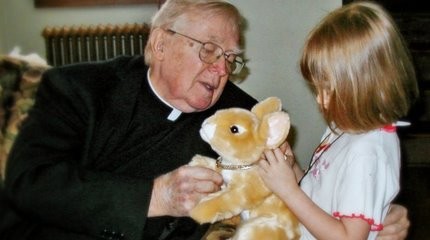
Father Ronald Lawler was an advisor to popes and cardinals. He was a bestselling author whose catechism fed millions of Catholics. To Franciscan University students at the turn of the millennium, he was a winsome and passionate teacher of theology.
Just before he died in November of 2003, Father Lawler arranged for his papers to reside permanently in the University’s archives. The collection includes his voluminous correspondence, his book manuscripts, lecture notes, and records of his consultations with Church officials and institutions. Since his activity spanned more than 60 years, it is a treasury of documents useful for historians, biographers, and other researchers. The world knew this Capuchin priest best as the co-author—with Archbishop Donald Wuerl—of The Teaching of Christ: A Catholic Catechism for Adults.
That project began with a direct request from Vatican officials, who were concerned that ordinary Catholics could no longer distinguish true Catholic teaching from counterfeits. There was a confusion of voices, all sounding very smart, all claiming to be authentically Catholic. As Father Lawler once told a reporter: “This was a turbulent time. Some catechisms were incomplete . . . Some were just trendy . . . So many . . . were creative, perhaps, but were unclear about what a person should believe and do to gain eternal life.”
The Teaching of Christ appeared, in 1976, as an authoritative voice, and it remained what one journalist called “the king of catechisms” until the Church’s promulgation of the Catechism of the Catholic Church in 1993. In that book, as in everything he wrote and preached, Father Lawler was absolutely clear about “what a person should believe and do to gain eternal life.”
That was his consuming passion, and he wanted it to consume the world—beginning with the people nearest to him. Shortly after his ordination, his superiors assigned him to teach seminarians. Eventually, he would serve as president of two major U.S. seminaries. Among his students were Cardinal Sean O’Malley, OFM Cap., of Boston and Archbishop Charles Chaput, OFM Cap., of Denver. Cardinal O’Malley remembered him as one of the most brilliant minds he had ever encountered. Archbishop Chaput said that no one “has had a more positive effect on my own life and thinking.”
Father Lawler also served on the philosophy faculties at Oxford University, St. John’s University in Jamaica, New York, the University of St. Thomas in Houston, Texas, and the Catholic University of America. His academic specialty was moral theory, and he could train his mind on highly technical questions, producing an important book on Philosophical Analysis and Ethics. In 1982 he was elected to the elite Pontifical Roman Theological Academy and was for many years the only academy member from the United States. He was inducted with two undisputed giants of modern theology, Henri de Lubac and Hans Urs von Balthasar.
Still, he often said that he preferred to use “words of no more than three syllables.” And, to the end of his days, he found it difficult to speak of the Catholic faith without tears. One of his students was Michael Sullivan, now president of Catholics United for the Faith. Sullivan, who received his master’s in theology from Franciscan in 2000, recalls sitting in “a hot, stuffy classroom” as “Father Lawler explained the Second Vatican Council’s description of the Eucharist as the ‘source and summit’ of Christian life. He stood before us, weeping, and explained that the council was terribly misunderstood and that the reverence that seemed to have been lost as a result of the confusion following the council must be regained. He said that it was our duty to bring back that sense of awe and reverence. Each time I’m at Mass I remember how Father Lawler looked. His obvious conviction—and his tears—spoke volumes to his students where mere words would have failed.”
Yet the “mere words” are succeeding as new generations of students encounter the words of Father Lawler that now reside in the John Paul II Library. LuAnn Boris, head of Acquisitions and Serials, supervises the students cataloging the Lawler papers. She says: “They all start out the same way—here’s a job I’ve been assigned to do. But at some point, Father Lawler becomes real to them. His personality comes through in his letters, lecture notes, and in other small ways. They come to know him as a fascinating and complex character. In the end, they all say the same thing—they wish they could have met him in person.”
One of those student workers was Andrew Lauria, humanities and Catholic culture major, who graduated in May 2009. He found a lesson in that mountain of paper. Father Lawler, he says, “was a man of such joy and peace and he shared this on every line of the many letters he wrote. I sorted through letters from the 1940s all the way to those written just before he died, and it was amazing to see that his joy remained throughout his life. He never stopped loving, even in the struggles and sufferings.”
Lauria hopes that the archiving of these documents “will allow many more to enter into the life of a truly great man.”
(Click Here for Fr. Ronald Lawler’s Bio)


